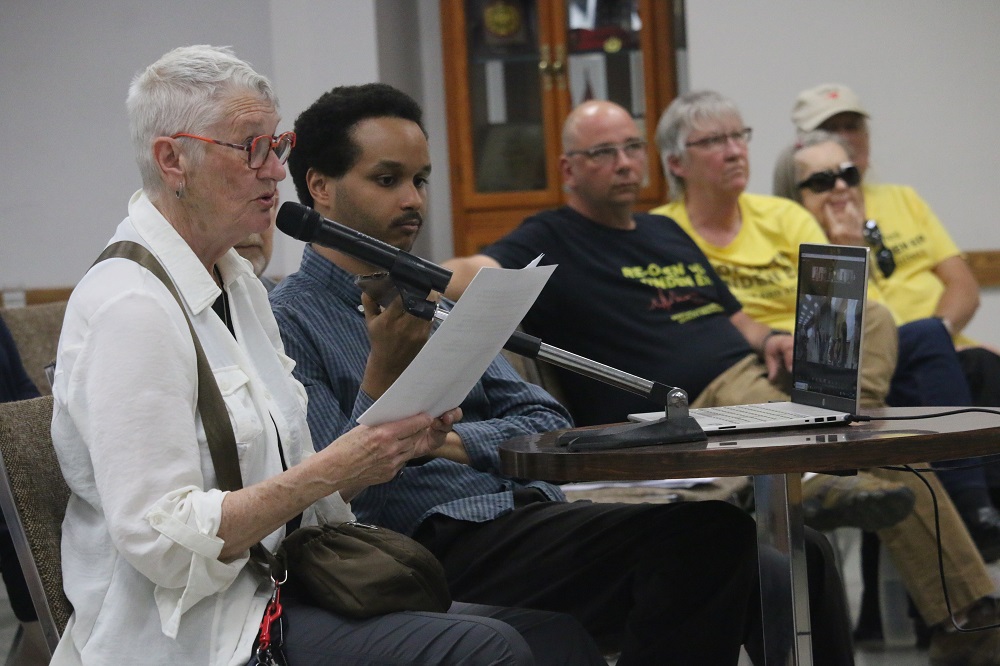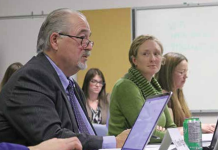County resident Bernie Davis said she and hundreds of other Highlanders are still struggling to come to terms with the closure of the Minden emergency department.
She was one of 10 registered speakers as the Ontario Health Coalition (OHC) brought its travelling roadshow to the Haliburton Legion June 14. The group wrapped up a tour of rural Ontario this week, having visited 14 communities that have been impacted by ER closures and cuts to other health services since early 2023.
Natalie Mehra, OHC executive director, said the hearings were an opportunity for people to provide feedback on local issues. She noted there have been more than 1,200 temporary closures of emergency departments and other hospital services in Ontario over the past 18 months – including the permanent closure of the Minden ER on June 1, 2023.
“We’re producing a report that tells the story of what people say is happening in their communities across Ontario… and have concrete recommendations to maintain and safeguard the services we have,” Mehra said. “Ontario funds hospitals at the lowest rate in Canada… we’ve had the most radical hospital downsizing than anywhere – we need to turn the discussion around and find ways to restore or improve lost or failing health services.”
Davis said the Minden ER shuttering last summer was akin to losing a family member.
“I had my two children in Minden, received mammogram and cardiac services there. People knew they could count on the Minden ER,” Davis said.
She was unhappy with how the HHHS board justified the decision, and criticized them, local MPP Laurie Scott, and Ontario health minister Sylvia Jones for referring to the closure as a consolidation or amalgamation. “Using those words would be like Mr. Putin saying he is amalgamating with Ukraine,” Davis added.
Taking issue with HHHS’ process to become a board member, Davis said it felt like a “closed shop” of people who don’t have the community’s best interest at heart.
“I lived through HHHS being developed – names like Jean Anthon, Hugh Nichols, Jack Brezina. They’re all still here and are trusted by the community. Everything now is about mistrust,” Davis said. “Currently, it seems our board decides who is eligible to run for a seat.”
Lauren Ernst, HHHS’ communications lead, said the board has a nominating committee that is responsible for recruitment. It receives applications and makes recommendations, which are considered by the full board. Anyone selected to serve is then presented at the AGM, where paid members of the organization can vote.
She said typically four directors turn over each year. Members may serve a maximum of three, three-year terms.
Ernst said there are two community representatives on each board committee, noting that’s usually a good starting point for anyone wishing to serve on the board.
Highlands East resident Valerie Hunnius said she hasn’t been impacted by the Minden ER closure but said she’s “deeply disturbed” by it. She believes Haliburton County needs more access to healthcare services, not less.
She called on the province to increase subsidization of training for doctors choosing to work in primary care in rural areas, enhance the OHIP fee schedule – with bonuses for doctors practising rurally, and provide more financial support to bolster family health teams in small communities.
Kinmount resident Alan Howard suggested one fix could be as simple as the province streamlining its processes around physician recruitment.
A volunteer with the Kinmount District Health Services Foundation, Howard said a new rule designed to improve access to health services is having the opposite effect in rural communities.
“If you’re a doctor and want to be part of a family health team, you must work within five kilometres of another member of that team. Out here, there are some people who drive five kilometres to get to their mailbox. That distance does not make sense for communities like ours, and is stopping us from filling positions,” Howard said.
The Kinmount group had a doctor waiting in the wings, but the Ministry of Health turned down the application due to the rule.
“Right now, if the Haliburton Highlands family health team wanted to expand services to Dorset or any other small community, they can’t,” Howard said. “It’s an inane rule that does not make sense in rural areas.”
Howard also criticized the way the province manages the northern rural recruitment and retention initiative. While Kinmount is included in the catchment area, the province turned down a different application recently because the physician wanted to work part-time for the Kinmount & District Health Centre and part-time in the ER at the Haliburton hospital. To qualify for the money, doctors must work full-time in one district only, Howard said.
“So Kinmount is eligible, Haliburton is eligible – but we’re not allowed to share the same doctor,” Howard said.





